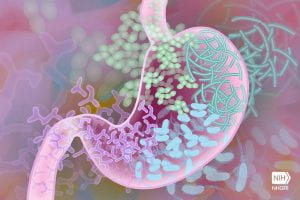This September, a potentially monumental study was published in the scientific journal, Cell, reporting that researchers have confirmed that microbes present in the gut can change, lower, or jumpstart our immune response. Previously research has only been done with other mammals such as mice, and this was the first study that linked the results to human subjects. Since most previous trials were conducted on other animals, researchers such as Dan Littman who studies microbiota at NYU School Of Medicine, emphasized there are likely to be large differences in the results for humans versus other animals.
Specifically, researchers found that people who have not received a flu shot or had the flu within the past 3 years and then were administered broad spectrum antibiotics, produced lower levels of antibodies to the influenza virus. Those subjects who did not receive the antibiotics produced more antibodies to the flu virus. This publication is so noteworthy because previously so little actual human clinical trials were performed to understand the role of the human gut microbiome and its relationship to the strength of our immune response.
Previous research on how the flu vaccine works and its varying efficiency among many people has been done. In 2011, Bali Pulendran, an immunologist at Stanford University, found that increased activity in the gene receptor that recognizes the bacterial protein flagellin, the core part flagella, seemed to stand out as the one major change among how well the flu shot was working in varying groups of people. This underscores the connection between the immune system’s recognition of bacteria (especially gut microbes) and how well people may respond to the flu vaccine.
In 2014, this research was followed by gene knockouts being given to mice for the receptor for bacterial flagellin in the flu shot. The results showed that the mice who received the knockouts made were antibodies than the control mice in the trial. The researchers suspected this reduction was controlled by the absence or presence of gut microbes and their ability to sense flagellin. To confirm this, researchers followed up with separate trial in which mice’s microbiota were reduced by the administration of antibiotics before receiving the flu vaccine and control mice who did not receive the antibiotics so their microbiomes remained present. The results again showed a link that gut microbiota play a role in levels of antibodies produced against their flu shot. Because of these results, it seemed obvious to test the same situation with humans.
The current study did just that and was designed as a Phase 1 clinical trial to determine if gut microbes are connected to the efficiency of flu vaccine immunity. 11 adults received broad spectrum antibiotics for 5 days and 11 served as the control and did not receive antibodies. All subjects receive the influenza vaccine on day 4. The people who received the antibiotics had reduced levels of gut microbes. However, no major difference was observed in response to the vaccine. These results prompted researchers to dig deeper and they next investigated people who had not had the flu shot or suffered from the flu virus within the last 3 years. They wanted subjects that would be relatively clear of flu antibodies to begin with. They repeat a very similar study with 11 people, 5 receiving the antibiotics and 6 serving as controls. Everyone got the flu vaccine, but this time the results showed a marked difference in vaccine induced immunity. Subjects who received antibiotics and had fewer microbes presents, made far fewer flu-specific antibodies.
This research is very promising not only in the field of flu vaccination, but could reveal that changes to microbiota can have profound impacts on future vaccine development for a variety of pathogens. Because the results were so tiring, Pulendran is continuing to research deeper into the relationship between gut bacteria and vaccines, for viruses that may affect us in the future. This holds promise for development of vaccines for a wide range of pathogens that attack the human race.



foodvacuolola
I find this really interesting because we can use the gut microbiome to help ourselves to have a better advantage of fighting sickness and other illnesses. I found a similar article talking about the logistics (https://www.thermofisher.com/us/en/home/life-science/sequencing/sequencing-education/microbiome-research-next-generation-sequencing/microbiome-influence-human-health.html) it discusses the same complexity about how the gut microbes can help and improve human help. For example, the article talks about the antibodies that can disrupt the microbiome as well. It is also fascinating because when I was researching about the human gut microbiome, my article states that even though there is so much unknown about the gut, it has helped us and advanced us in scientific research. I am so excited to learn more about this and see how humans’ immune systems react. It is crazy to think we have all the resources to impact future vaccines. Great work!